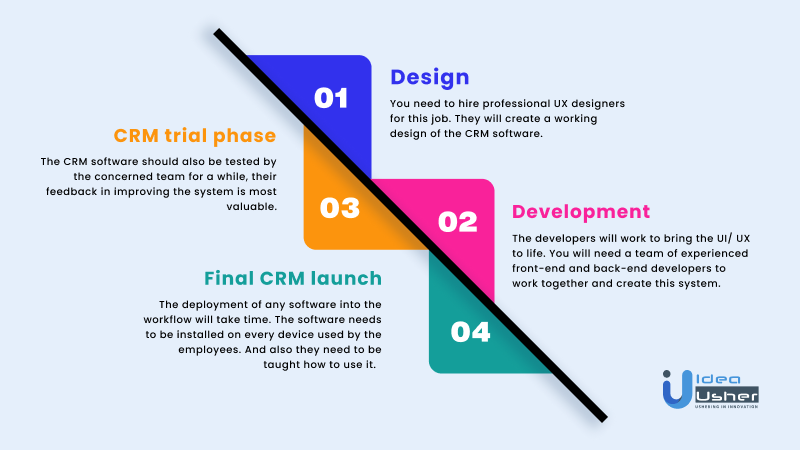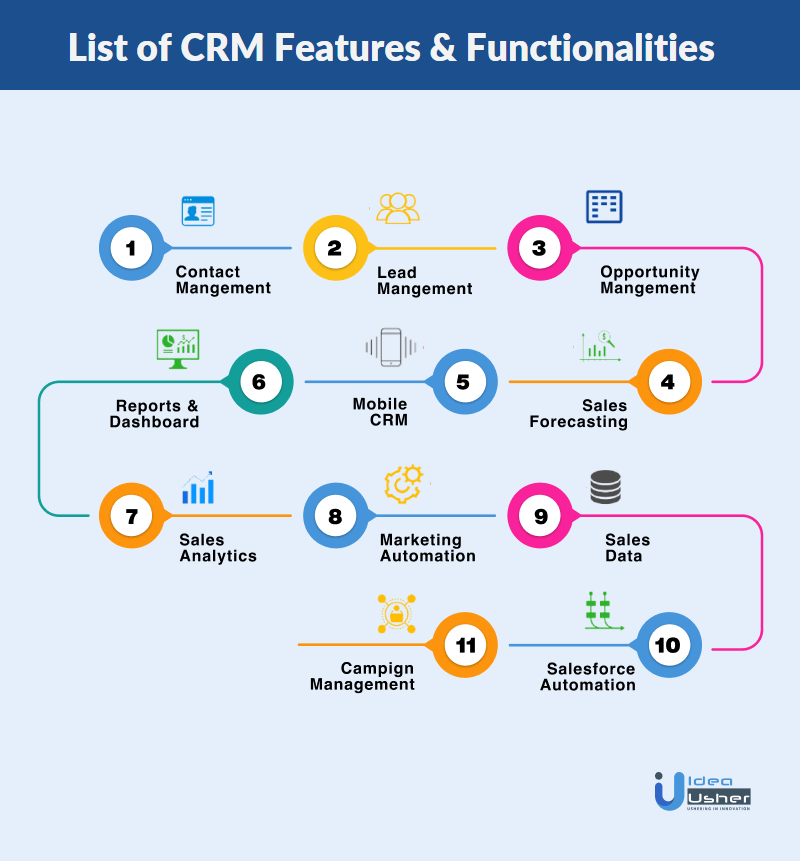
CRM software can really make it easy for companies to operate with a large team. It automates most of the tasks that take a lot of time to be done manually and thus saves a lot of money.
What does CRM software stand for?
CRM software stands for Customer Relationship Management software. CRM software helps businesses improve in many dimensions namely, sales, marketing, and especially customer support. It helps the company in both customer retention and customer acquisition.
In this article, we are going to look at how to build custom CRM software in 4 easy steps. We will also check out the various benefits, limitations, and requirements of CRM software.
Why do you need a custom CRM?
Let’s look at why you should consider making a custom CRM over a ready-made one:
1. You Need A System That Fits Perfectly:
Ready-made CRM Software sure do have its benefits but, it might not fit into your business model perfectly. A ready-made CRM software will only connect with a limited number of given platforms. However, a custom CRM is built keeping your business in mind. This makes sure that you can fit the software easily into your arsenal.
2. Time/ Money Management:
CRM software automates a big chunk of your work. This saves time and hence a smaller team can sort through the list of leads quicker and faster.
3. Presentation:
A ready-made CRM is like a suit you bought off the internet. Everybody around you probably owns one. It doesn’t create an image that makes you unique. A UI/UX of a custom CRM software can be modified according to your specific requirements, it’s tailor-made and reflects the overall presentation of the company.
How to Build a Custom CRM Software in 4 Easy Steps:
There are 4 essential steps that lead to a beautifully functional CRM software. Let’s have a look at them.

1. Design:
The design of your CRM software is not required to be extremely appealing. It should just be user-friendly and easy to navigate. You need to hire professional UX designers for this job. They will create a working design of the CRM software.
Once the CRM is ready, you can get a UI professional to make it more attractive and pleasant to look at. This will make sure that the workflow scheme for your business is properly followed.
2. Development:
Once the designs and workflow are ready, it will be followed by the developing team. The developers will work to bring the UI/ UX to life.
You will need a team of experienced front-end and back-end developers to work together and create this system. Also, you need to load test the software which can be done by QA engineers.
3. CRM Trial Phase:
The CRM software should also be tested by the concerned team for a while since their feedback in improving the system holds value. Since they are the ones who are going to use the system, they can give very valuable ideas. If implemented, they can make the entire system much more efficient.
4. Final CRM Launch:
The deployment of any software into the workflow will take time. The software needs to be installed on every device used by the employees. And also they need to be taught how to use it.
It will also take some time for them to become comfortable with the new software put in place. You also need to keep a watchful eye on the analytics and user’s behavior on the platform which will help you improve the CRM software phenomenally.
How does CRM software work?
Now that you know how to build a custom CRM software, let’s look at how it works. As a company gets more leads, CRM software effectively keeps track of the client via social media, emails, and other platforms. It studies the profile of every customer, or potential customer and analyzes their behavior over time. This information helps you either to retain or convert them into loyal customers.
Let’s look at an example: Say you are a real-estate agency, and your team receives a call from a person wanting to buy a house. Your team asks them various relevant questions like, “Do you have a specific neighborhood in mind?”, “Where did you live before this?” “Why are you leaving the place?”. And so on.
The potential customer will give very valuable data. It will come in handy when making the sale, this data directly goes into the CRM system. Accordingly, the best-suited salesperson for the job will be assigned to make this sale. After the first contact, the CRM system can set another follow-up call 48-hours later.
Conversely, if the lead fails to show interest or is unsure for some reason, it will also be recorded by the CRM and the team can spend less time and effort behind that customer.
Basically, the point of a CRM system is to make the team’s time and effort more profitable for the company. This helps in giving direction and a better and more pinpointed approach to the team. Rather than the “Call everyone, ask them if they need a house” approach.
Advantages of custom CRM software:
Now let’s look at some of the advantages of having CRM software in place. The infographic shown below lists all the functionalities of a custom CRM software.

Some of the features in a custom CRM are listed below:
- Contact Management: A custom CRM is able to manage thousands of contacts of leads, potential clients, current clients, former clients, partners, and associates. This increases productivity and speeds up the process.
- Lead Management: you can keep track of all the leads, with crucial data points. For example, comments they had made on a phone call, about a year ago, how the issue was addressed. All this data can be helpful when following up with the client.
- Opportunity Management: CRM software can keep track of all the upcoming events, partnership programs, or associations that might be beneficial for the company.
- Sales Forecasting: Sales forecasting is the process of estimating future revenue by predicting the number of products or services in a sales unit.
- Mobile CRM: A custom CRM can be made in a way so that it can be accessed by a mobile device.
- Reports and Dashboard: you can get access to reports and dashboards which can be used to analyze the sales pipeline and make changes.
- Sales Analytics: Sales analytics are crucial when it comes to increasing revenue, and a custom CRM can help you with the same.
- Marketing Automation: A ledger of all marketing activities including marketing strategies, promo codes, ads, etc and its analytics can be easily maintained in the CRM.
- Sales Data: Data points on the sales that are already done can be maintained, this way if an old customer returns to buy from the brand again the brand can remember the client’s preferences, and sell them a better product.
- Salesforce Automation: A large part of the sales process can be automated using CRM software.
- Campaign Management: Marketing campaigns can be managed and optimized easily from the CRM dashboard.
1. Tailor-Made Things Are Always Better:
As you have realized by now, custom-made CRM software is far better than a ready-made one. The custom-made software is optimized for handling data that is specific to your business. This makes things far easier for the employees working with the data. The faster you can sort through data, the lesser it costs you.
2. Automates Your Workflow:
Custom CRM systems are capable of automating analytics, sales, customer support, marketing, delivery notification, and billing. There might be very specific kinds of automation you are looking for, this is not possible to get in a ready-made CRM software.
3. Customer Data Analytics:
Although ready-made CRM systems can help you sort through general customer data like location, age, sex, etc, you still require a deeper understanding of where you are retaining more customers and where you are losing them. It will definitely help you increase the revenue figure. This can only be achieved through CRM software that computes the data using very specific filters.
4. Centralized Structure To Your Business Processes:
CRM software will help you monitor your team digitally with a bird’s eye view. This will allow you to help your team manage time more efficiently and therefore ramp up your profits. In addition to that custom CRM software allows you to work with databases that are used in your company specifically.
Important things that people won’t tell you about CRM software:
- Keep Your Goal in Mind:
While making CRM software you must always keep your goal in mind, is it to automate the workflow, or is it to study customer profiles or both. These things can help you select and make features that will increase the profitability of your company and the CRM software.
- Legal Restrictions:
There might be various legal limitations when it comes to CRM software collecting data on your leads. Privacy policies of social media platforms, websites, etc. shouldn’t be violated at any cost. Also, there might be state/ federal laws restricting you to what data you are allowed to collect and store. Be aware of them and then develop the features.
- Compliances:
Your CRM software must comply with authorities like the ISO, FDA, or ASTM. So list down the primary features of your CRM software and make sure they comply with these requirements.
- Select Type:
There are 4 major types of CRM systems namely, operational, analytical, communication, and strategic. Select the type best suited for you or you can even go for a mix of all of them.
Operational CRM: This aspect of CRM provides support for different business processes including sales, service, and marketing.
According to crm.walkme.com/ Analytical CRM: A company collects data about its customer interactions, to increase customer satisfaction and customer retention rates.
timreview.ca says that a communication CRM is used to manage and enhance a company’s interactions with its customers.
According to tutorialspoint.com a strategic CRM is a CRM software that collects, segregates, and applies information about customers and market trends to come up with a better value proposition for the customer.
Idea Usher has a team of expert developers and designers who are ready to assist you with making custom CRM software. We are experienced and have a solid understanding of the design and development phase of your custom CRM system. It will cost somewhere between $12k to $20k to build a custom CRM system.
Teams that require your CRM software:
CRM software is useful for any team in any genre of business. Let’s look at some of the teams who will reap maximum rewards and how they are going to use the CRM software.
1. The Sales Team:
The sales team will be your first point of contact with the lead. Therefore to make them look and sound sharper is a requirement for every company. This can only be achieved when the salesperson has enough information on the customer to build a rapport with him/ her.
Rapport building is crucial when it comes to sales and there are specific CRM features that can help you achieve the same:
1. Profile Management:
The CRM can maintain an archive of information about every lead separately
and this will come in handy when following up with a certain lead.Take the real-estate agency example, the lead will provide valuable information like why is he leaving his old house and what kind of a house he is looking for. This might be hard to remember when you are talking to 50 people a day.
But, CRM software will keep track of all this data. Just skim through it before a call or a meet and you will be set to make a sale.
- Sales Scheduling:
The custom CRM software can keep track of what marketing campaigns are going on, this will allow you to better negotiate with leads and convert them into customers. It will also help you to keep a tab on all the offers and discounts you can offer to potential clients.
- Sales Analytics:
Your sales team can study analytics and can identify the different stages where they are gaining and losing clients. This will allow them to improve on their sales pitch and make a better impression on their clients.
2. Marketing Team:
Marketing teams will be greatly benefitted from the integration of CRM software in the business model.
CRM software helps marketers keep track of all the marketing events and seasonal offers. Targeting clients using ads on Google, Facebook, and Instagram can hit the bull’s eye! This will help the team optimize ad campaigns and make them more profitable.
Marketers can leverage all the data available on a particular profile to make personalized offers to them.
Business performance analytics can also be used by markets to study which Ad campaigns were successful and why that might be. This will help them get a clearer idea of whom to market their product to. A custom CRM will create great value when it comes to the analysis of a customer base.
3. Support Team:
Communication and follow-ups will be greatly improved with the integration of a custom CRM system. This will make the customers feel better and give a higher rating of your business online.
Once your customers feel valued, they become loyal to your brand. Then it doesn’t even matter if you charge them a bit extra. They get a feeling of being important which is very crucial when it comes to customer retention.
Conclusion:
CRM software helps you get a deeper understanding of your customer base and thus helps you retain and convert more clients. Learning how to build a custom CRM software although easy can take a lot of time.
This problem can be resolved by hiring designers and developers who are familiar with what CRM software is and how does it work. This will allow them to create a suitable custom-made CRM system for your business.
Idea Usher has a team of expert developers and designers who are ready to assist you with making custom CRM software. We are experienced and have a solid understanding of the design and development phase of your custom CRM system. It will cost somewhere between $12k to $20k to build a custom CRM system.
FAQ Section:
1. What are the 3 components of a custom CRM system?
The 3 main components of CRM systems are:
- Salesforce automation
- Marketing Analytics
- Support and help desk.
2. What is the difference between CRM and e-CRM?
A conventional CRM relies on older forms of communication like telephone calls, letters, Fax, etc. While e-CRM is based on newer technologies like email, Facebook, Instagram, in addition to older mediums of communication.
3. How difficult is it to build a CRM from scratch?
It is not particularly difficult to build a CRM from scratch, it is just that it will take a ridiculously long time to learn to build one and thus will cost way more than it is worth.













Ronit Banerjee